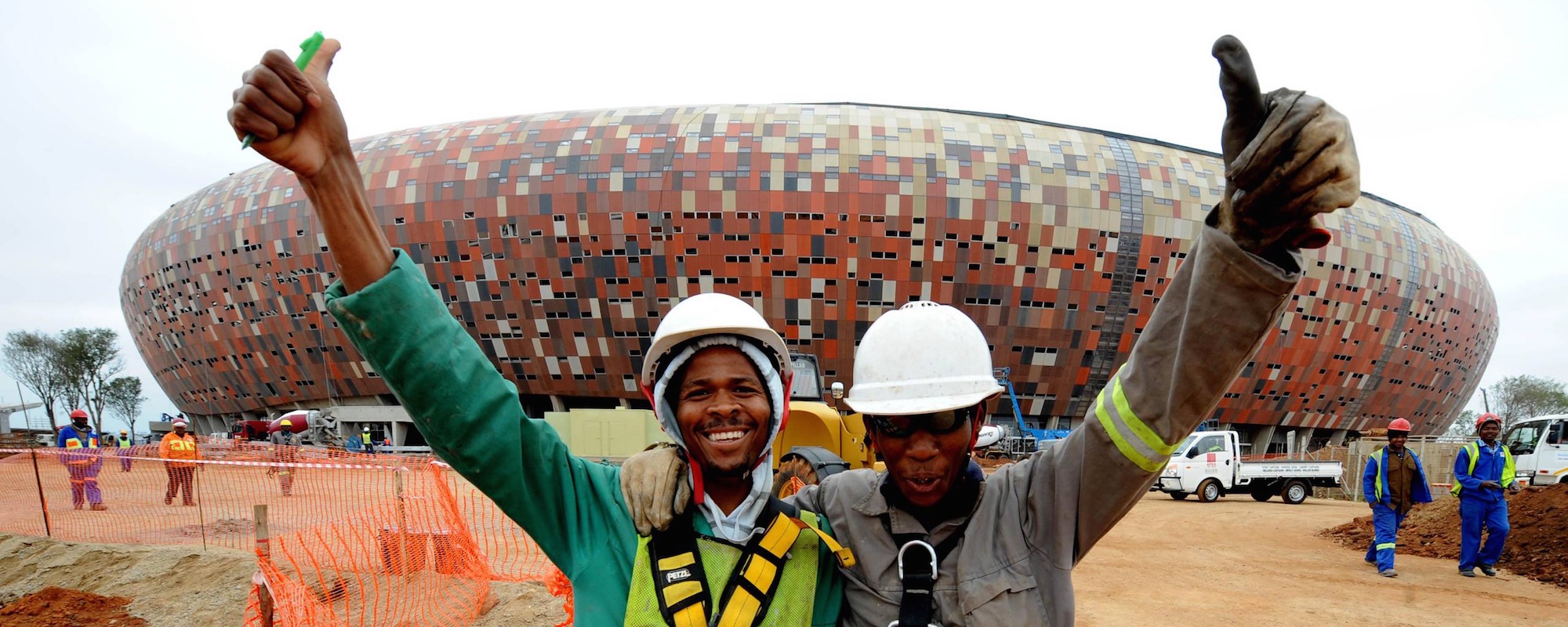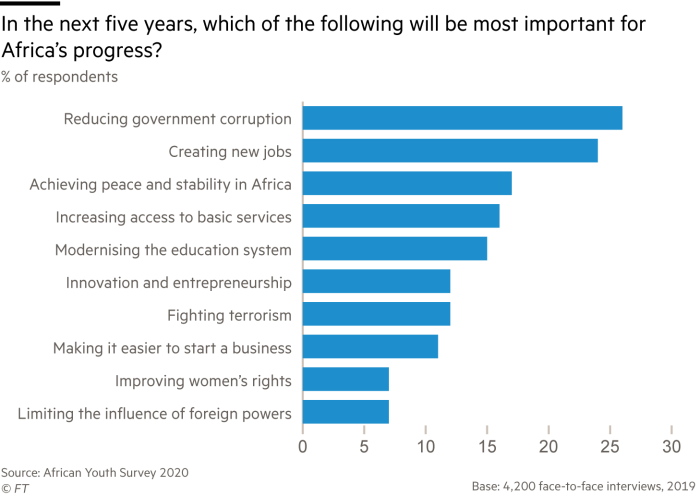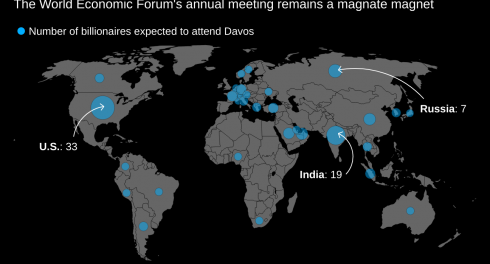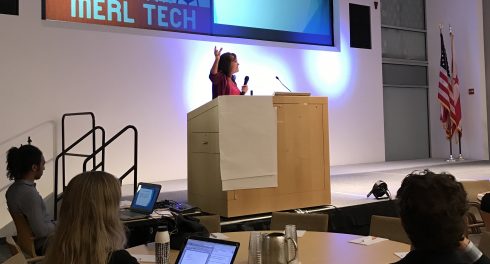Highlight:
- Chart topper
- It’s all intersectional
- Hard bargain
- Crocodile rocked
- Artificially blessed
- Just do it
- TAI Spotlight: Philanthropy must stop fiddling while the world burns
Chart topper

Photo Source: True Africa
Fascinating insights on everything from appetite to democracy to most popular job sectors in the newly released African Youth Survey 2020, based on interviewing 4,200 youth Africans across 14 Sub-Saharan countries. While there is a spirit of optimism across the responses, it is interesting to see government corruption top the list of issues where youth most want progress. Given this upcoming generation is more online and tech savvy than their elders, perhaps more potential to bring them into the fight against corruption?

Of course, the need to inspire action against graft is found all around the globe. Roxanne Patel Shepelavy asks “Who is Philly’s Integrity Icon?” at the launch of the competition to find the city worker who does the best to help Philadelphians. We look forward to seeing how a model tested from Nepal to South Africa to Liberia plays out in the United States.
It’s all intersectional
At TAI, we are always interested in tracking how greater transparency, participation, and accountability can drive actions to solve bigger agendas. This week offers no shortage of examples of how those bigger agendas also overlap. A study of the inclusive Buen Vivir Fund links participation to economic advancement in civil society. Elizabeth Yee and Joseph Curtin argue that inequality reduction and greater inclusivity are complementary to fighting climate change, while David Attenborough urges inclusivity and participation in the democratic process as key to solving the climate crisis. Thinking of the democratic process, Joe Goldman urges foundations to do more to help grantees fight for free and fair elections this year.
Hard bargain
Those in development know that money and power are as crucial as good intentions. Navigating that reality is critical to achieving social accountability. John Gaventa picks up on the recent IDS research (previously featured in the Weekly) reflecting that achieving accountability is a difficult bargain that could potentially empower yourself and others. It’s all the more tricky in “difficult settings.” What to do? Mariz Tadros shares eleven recommendations for working on empowerment and accountability in such contexts. Both might agree with Christian Seelos that systems change isn’t supposed to be quick, or even about solutions, but rather “…discovering and steering local pathways for change at a pace appropriate for our ability to learn and for what local communities can enact and absorb.”
For those who do push for change, the risks are all too real. Tanzanian journalist Erick Kabendera is released from prison, but only after pleading guilty of tax evasion and money laundering – a case many see as politically motivated. Elsewhere, Guatemalan civil society is at risk from repressive reforms, while data in Brazil suggest rising violence goes hand in hand with state impunity. Débora Lima and Júlia Rocha ask if Brazilian civil society can push back and reinforce more equitable and open government.
Crocodile rocked
The Congolese oil block named Ngoki – ‘crocodile’ in the local Lingala language – has been secured by one of Africa’s richest men, Claude Wilfrid Etoka. Global Witness partners with Der Spiegel and Mediapart journalists to reveal serious corruption risks, environmental assessments that are completely unfit for purpose (in addition to extracting oil, the project would drain peat bogs and further exacerbating carbon release) and expose claims of vast oil reserves as seemingly hollow.
Sticking with oil, environmental groups are angry at the World Bank for agreeing to lend $55m to train officials and upgrade financial institutions in Guyana in preparation for offshore oil development. What to do? Avoid complicity in anything fossil fuel related, or take the view that the government will extract this oil regardless so better to try and help steer to be done in way that will translate into better outcomes for Guyanese? At least World Bank funds do not take the form of a resource-backed loans that would take oil for repayment. The Natural Resource Governance Institute team dig into the realities of 52 such loans that offer risks and opportunities, but with any benefits typically undermined by the opacity of the deals.
None of the documented resource backed loans are in Asia, but that doesn’t mean that there isn’t a need for more corporate transparency. Read up on why Southeast Asia has been laggard in corporate disclosure.
Essential Watching: What does social impact look like?
Enjoy the cream of the crop of social impact films, curated and awarded by the Social Impact Media Awards.
Artificially blessed
As open government efforts yield data – much more can be done with that information by civil society, media and government alike. Sophie Brown draws our attention to the fact that all Mexico’s public contract are now on one platform run by civil society. Check out Todos Los Contratos. Across the ocean, Patrick Egwu reports how Nigerian organizations are teaching journalists where to find stories in budget data. Meanwhile, one story right out in the open is the potential return of $100m of embezzled Nigerian assets to a politician allegedly complicit in their initial theft. Auwal Musa Rafsanjani explains.
Beyond assuring integrity, a new EU report suggests open data also creates value by increasing efficiency. Who wants to be the first to find value in structured, bulk ownership data made available by Open Ownership?
What of data risks? Emma Smith worries that smart cities and biased algorithms favor the needs of higher incomes individuals to the exclusion of the poor and marginalized. Smith might find solace in Nani Jansen Reventlow’s call for a global, inclusive digital rights movement.
Such a movement will likely throw up some unlikely bedfellows but perhaps none more so IBM, Microsoft, and the Catholic Church. The Vatican gets in on the digital act, joining the tech giants in an “ethical resolution” for AI uses. A couple of weeks back, we mentioned the creation/use of synthetic data as one way to deal with big data risks, and Khaled El Emam follows up lauding that approach to allow for accelerating AI applications.
Just do it

Hannah Paterson and Katy Love tell us how to make participatory grantmaking a reality. Part of the problem is that sometimes, the grantees foundations fund are sidelined from philanthropic discussion. The Center for Effective Philanthropy offers new data on their perspectives.
Meanwhile, Rachele Tardi and Zachary Turk from TAI member Open Society Foundations reflect on developing disability-inclusive grantmaking. Spoiler alert, its more than just a commitment, it’s a system change.
Finally, Wall Street (and many retirement accounts) had a rough week. This may translate into non-profits and foundations having fewer funds for giving as most lack a recession plan.
Essential Listening: Where are future philanthropic dollars coming from?
Listen to Giving With Impact’s podcast on “The Economy, Taxes, and Philanthropy: How Donors can Make the Most of Their Giving Today and Tomorrow”
TAI Spotlight: Philanthropy must stop fiddling while the world burns
Philanthropy must stop fiddling while the world burns| Hewlett Foundation
Hewlett Foundation President Larry Kramer makes an urgent call to action to philanthropic organizations to increase climate giving. “If we fail on climate, we fail on everything,” says Kramer.
Confronting shame—and accepting my disability—with Judy Heumann | Ford Foundation
Ford Foundation’s Social Media Engagement Strategist, Marc Climaco, shares how disability justice activist and legend, Judy Heumann helped him confront the shame of having a disability. Judy helped the foundation shaped its work on disability inclusion and now her story is now available as memoir here. In the words of Judy: “What gives me hope today is the fact that more people are recognizing that disability is a normal part of life. We should not feel ashamed.”
ScholarForum: Reflections from Africa | Open Society Foundations
Read essays and creative works by Open Society Scholarship Programs’ grantees and alumni spanning issues of folk media in Ethiopia to how people with disabilities in Zambia can have a greater influence on the laws that directly affect them. This edition also features the voices of two alumni who provide updates on education in Myanmar, and on projects in Egypt that are changing entrenched norms around women’s rights.
Calls and job listings
Job postings at Ford Foundation – Ongoing
Job postings at Luminate – Ongoing
BetterTogether Challenge for innovators – Ongoing
Democracy Fund: Sr. Associate, Strategy & Learning – Ongoing
Oxfam: Extractive Industries Regional Advisor – Ongoing
Hewlett Foundation Call for Expressions of Interest (EOI) to review its grantmaking impact in Mexico – March 18, 2020
Co-Impact systems change grants (round three) – March 31, 2020
Call for suggestions on Humanitarian and Development Data Forum agenda – May 2020
Call for proposals – Swashakt: Empowering women through collectives and group-based approaches – April 14, 2020
Proposal Submission for the 2020 Summer Evaluation Institute – June 7-10, 2020
Amartya Sen Essay Contest 2020: Illicit financial flows – August 31, 2020
Call for Submissions to SSIR Series: Social Change in an Era of Extreme Polarization – Last Thursday of every month until early 2021.
Calendar
The Light that Failed: Why the West is Losing the Fight for Democracy. A conversation with Ivan Krastev and Radoslaw Sikorski – March 4, 2020 (Brussels, Belgium)
How is Life in 2020? Better Life Initiative: Measuring Well-Being and Progress – March 9, 2020 (OECD Conference Center, Paris)
Webinar on #ShiftThePower and systems change: How can we map our progress? – March 10, 2020 (Online)
Peacebuilding around harmful international investments – 11 March 2020 (San Francisco, United States of America)
The Data Delusion: Reclaim Your Collective Rights – March 15, 2020 (Hilton Austin, Texas, United States of America)
Media and democracy: the way forward – March 20, 2020 (Rue des Tanneurs 60A, Brussels)
The Impacts of Civic Tech Conference (TICTeC) – March 24 – 25, 2020 (Reykjavik, Iceland)
Register for the 2020 OECD Global Anti-Corruption & Integrity Forum – 25-26 March 2020 (Paris, France)
EGAP Learning Days workshop – March 30-April 3, 2020 (Addis Ababa, Ethiopia)
Global Technology Governance Summit – April 21-22, 2020 (San Francisco, United States of America)
Shaping the Future Forum 2020 – April 22 & 23, 2020 (Washington, DC)
3ie London Evidence Week Conference 2020 – April 23, 2020 (London, UK)
Frontiers of Social Innovation: People, Power & Resources: The Redistribution Wave – May 12-14, 2020 (Stanford University, California, USA)
Transparency International: 19th International Anti-Corruption Conference – June 2 – 5, 2020 (Seoul, South Korea)
Human Rights Litigation Summer School at Berlin, Germany – June 8-12, 2020
Women and Girls Africa Summit – June 9-12, 2020 (Durban, South Africa)
RightsCon 2020 – June 9-12, 2020 (San Jose, Costa Rica)
Humanitarian and Development Data Forum – November 2-4, 2020 (Chambery, France)
International Open Data Conference –November 18-20, 2020 (Nairobi, Kenya).


